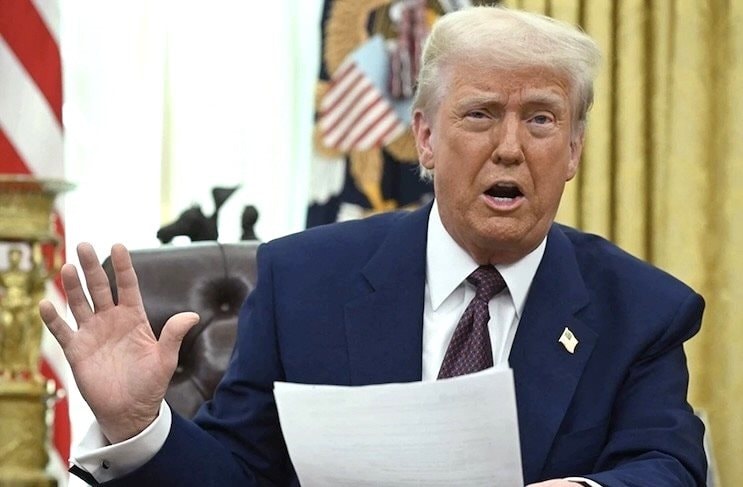The administration of President Donald Trump has sparked a wave of global controversy by issuing a "reciprocal tariffs" policy, imposing a minimum 10% tariff on all imported goods, with higher rates for countries with large trade surpluses with the U.S. The decision has quickly rattled global financial markets, drawn fierce backlash from major trading partners, and raised concerns about the onset of a new trade war.

Reciprocal Tariffs – What Are the Impacts?
Trump's "Reciprocal Tariffs" policy emphasizes trade fairness by applying equivalent tariffs to nations with significant trade surpluses with the U.S. Unlike previous tax packages targeting specific sectors, this policy covers a wide range of imported goods from targeted countries, leading to broader and deeper impacts.
Specific tariff rates include: China at 54%, Vietnam at 46%, Taiwan at 32%, South Korea at 25%, Japan at 24%, and the EU at 20%. Nations with close trade relations but lower deficits or close political alliances like Canada and Mexico are exempted from this round but remain affected by other tariff policies related to fentanyl.
The U.S. government argues the measure aims to reduce a growing trade deficit (exceeding $1 trillion in 2024) and revive domestic manufacturing. However, experts warn that such intervention could disrupt global supply chains and provoke retaliatory measures from trading partners.
Risk of a Trade War Escalating
Shortly after the announcement, numerous countries and international organizations voiced strong opposition. China labeled the move as blatant trade protectionism and declared it would “not back down,” preparing equivalent retaliatory tariffs on American goods.
The European Union (EU), via Commission President Ursula von der Leyen, criticized the U.S. move as “irresponsible” and contrary to global trade principles, preparing to take the matter to the World Trade Organization (WTO). Japan and South Korea, despite being U.S. security allies, deemed the tariffs unjustified and disproportionate.
Vietnam, facing the second-highest tariff rate, expressed deep concern, arguing that the policy severely harms millions of workers in key export sectors like textiles, electronics, and seafood. The Vietnamese Ministry of Industry and Trade urged bilateral talks and called for broader ASEAN cooperation to reduce dependency on the U.S. market.
Global Financial Markets Stagger and Supply Chain Crisis Looms
Just hours after Trump's announcement, major stock indexes in the U.S. and Europe plummeted. The Dow Jones dropped 1,679 points (4%), the S&P 500 fell 4.84%, and the Nasdaq nearly 6%—the steepest declines since the COVID-19 crisis. The market lost over $3.1 trillion in value in a single trading day.
Consumer and tech giants like Apple, Nike, and Tesla were heavily affected due to their reliance on global supply chains, especially in China and Southeast Asia. Meanwhile, the U.S. dollar depreciated amid investor anxiety, while gold and the Japanese yen surged as safe-haven assets.
Beyond financial markets, U.S. business leaders raised alarms. The National Retail Federation (NRF) and the National Association of Manufacturers (NAM) warned that these tariffs could drive up domestic prices, suppress consumer demand, stall growth, and trigger mass layoffs if tensions persist.

Inflation, Recession Fears, and Geopolitical Risks Intensify
Renowned economists believe Trump’s tariff policy will have counterproductive effects and fail to achieve its goals. Prof. Kimberly Clausing from the Peterson Institute stated that the tariffs would fuel import-driven inflation, especially for consumer goods such as food, apparel, and electronics, making American consumers the biggest losers.
The OECD and World Bank both warned that global growth could fall from 2.7% to 2.1% if major U.S. trading partners respond in kind. A broadening trade war could plunge the global economy into recession amid ongoing energy crises and geopolitical tensions in the Middle East and Ukraine.
Another major risk is that countries like China, Russia, and Iran might use the opportunity to establish separate trade alliances to bypass the U.S. dollar and Western-led financial systems, accelerating a divided global economy and prolonging conflict between economic blocs.

Reciprocal Tariffs: Economic Shield or Global Gamble?
Trump's “reciprocal tariffs” policy is not merely an economic measure but a politically charged move aimed at reinforcing the “America First” mantra after the 2024 election campaign. However, blanket tariffs lacking nuance may turn the U.S. into a victim of its own protectionist agenda.
As the central hub of the global trade network, the U.S. holds the power to shape economic order but also bears the responsibility to maintain its stability. When unilateral decisions override dialogue and cooperation, the consequences stretch beyond short-term inflation and market losses—they erode trust in the multilateral trade system.
This policy might rally domestic voters, but without strategic recalibration and international negotiation, it could signal the dawn of a new trade order—where rules give way to raw power and short-term wins eclipse long-term responsibilities. That’s a future no economy, not even the U.S., can afford to sustain.